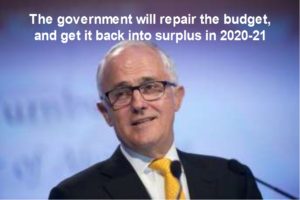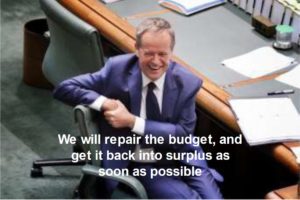Budget 2018: another unfortunate budget
Steven Hail
The Federal Government’s 2018 Budget is based on a fundamentally flawed premise, which will drive the private sector further into debt. The government will repair the budget, and get it back into surplus in 2020-21


The Federal Government’s Budget Statement tells us that:
‘A sustainable budget supports economic growth, creates opportunity and boosts the living standards of Australians, while guaranteeing the essential services they rely on.’ So far so good. A sustainable budget would indeed do that. And:
‘A balanced budget enables the government to provide responsible tax relief to encourage and reward working Australians, to back businesses to invest and create jobs, and invest in nation-building infrastructure that busts congestion, makes our roads safer and gets what we produce to market.’
No, it does not do these things. This is completely incorrect. Balanced budgets do not enable our federal government to do anything at all. Relative to a fiscal deficit, a balanced budget reduces demand for the things businesses sell, prevents more jobs being created and reduces the funding for nation-building infrastructure, including green infra- structure. You could even say it limits tax cuts — if tax cuts are your thing. It doesn’t enable the government to do anything useful. In the absence of a current account surplus on the balance of payments, it drives the private sector further into debt.
The statement also indicates that:
‘It puts the government on the road to paying down debt, which will position Australia to take greater advantage of future economic opportunities, as well as creating a buffer to withstand any future economic shocks that could impact on the living standards of Australians.’
Wrong again. Federal government “debt” is the net financial assets of the non-government sector, in Australian dollars. That includes the private sector and the rest of the world. “Paying down debt” just means destroying Australian dollars. It does nothing to ‘position Australia to take advantage of future economic opportunities’. It does nothing to create any sort of ‘buffer to withstand future economic shocks’. And it does nothing to protect the living standards of Australians.
What it does is to provide an excuse for cutting government spending on public services below where it could otherwise have been, and keep underemployment in place, when underemployment is unnecessary.
And the fourth point stated:
‘All of this is reliant on a Government that builds a strong economy and lives within its means.’
Again, this is fundamentally wrong and founded on a misconception stemming from the misleading metaphor of a (currency-issuing) government, as though it operates like a (non-currency- issuing) household.
The means of the economy, including the government, are the people, skills, physical capital, technology, infrastructure and natural resources, including most importantly, the ecological services provided to us by the natural environment. They also include net imports, if the rest of the world wishes to net save in our currency. Our government does not have “means” at all, other than in this sense.
The means of the government are not determined by the amount of taxes it collects, now or in the future — except insofar as taxes are necessary to limit total government and private spending to the ecologically sustainable productive capacity of the economy.
More than likely they won’t hit their target of a balanced budget anyway. It rests on optimistic assumptions about export prices, wage growth, the willingness of people – who are already up to their eyeballs in debt – to take on even more debt and the willingness of banks and financial regulators to keep pushing debt onto households, like drug pushers selling heroin.
The point is that in an economy with many unmet needs for public investment, serious problems with close to 15% unemployment and underemployment, long-term unemployment, high youth unemployment and with one of the two highest ratios of household debt to GDP in the world, a balanced budget commitment or, worse still, an aspiration for fiscal surpluses, is crazy.
A budget surplus drains safe dollars from the financial system. Who in their right mind would want to do that in Australia under present circumstances? The Turnbull Government and our major opposition parties – it must be said – still have their macroeconomics all wrong.
They think they can run out of dollars. They can’t. They think they need our dollars. They don’t. We need their dollars. They must think we are the currency issuers. We aren’t. They are.
Once our governments remember this, because they used to know it but seem to have forgotten, we can start to have a sensible conversation about the appropriate role for the government and its budget to play in a 21st Century economy, in one of the richest societies the world has ever known — albeit one with major ecological and social challenges ahead.
Right now, the nation’s politicians and the serious people in suits who are paid to comment on politics, seem to have no idea at all how a modern monetary system works. This is unfortunate.
This work is licensed under a Creative Commons Attribution-NonCommercial- NoDerivs 3.0 Australia License
Source: Independent Australia, 9 May 2018 https://independentaustralia.net/politics/politics-display/budget-2018-another-unfortunate-budget,11480
Dr Steven Hail is a Lecturer in Economics at Adelaide University and is an ERA member



























